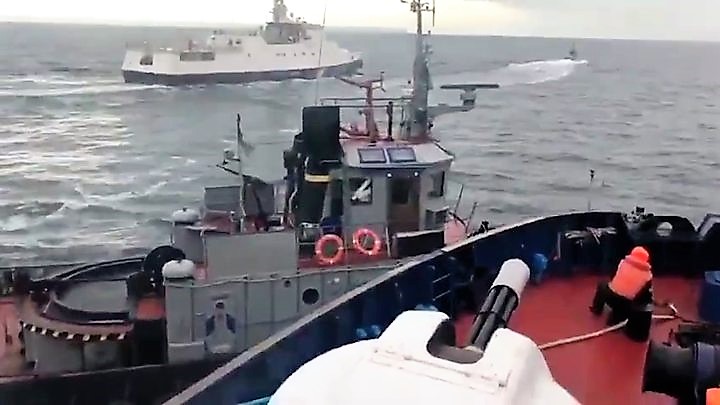As world leaders denounced Russia’s aggression against Ukraine, President Donald Trump waited more than a day before offering a muted response about the clash.
Ukraine’s parliament is to decide whether to bring in martial law, after Sunday’s capture of three of its naval vessels and 23 crew members by Russia.
The three ships were sailing off the coast of Crimea, which was annexed by Russia in 2014, when they were seized.
Russia opened fire, before its special forces stormed the vessels.
Between three and six Ukrainians were injured.
Ukraine said it was a Russian “act of aggression.”
Ukrainian President Petro Poroshenko said today he was proposing that parliament back a 30-day martial law – half the length of that recommended by Ukraine’s security and defence council.
When asked how he felt about the clash, Trump said, “not good. Not happy about it at all.”
He seemed reluctant to blame Russia, adding, “we do not like what’s happening either way. And hopefully it will get straightened out.”
Trump and Putin spoke one-on-one at a meeting in Helsinki in July.
Lawmakers and Americans still don’t know the substance of what was discussed during the two hour private meeting, but questions surrounding Trump and Russia have swirled since before he won the election.
Trump will meet again with Putin at a G20 meeting in Argentina.
In the 24 hours after Russian ships opened fire on and seized three Ukrainian vessels near Crimea, German Chancellor Angela Merkel, a spokesman for British Prime Minister Theresa May, the foreign ministers of Germany, the UK and Canada, European members of the Security Council, including France, Sweden, Poland, the Netherlands and the UK, as well as several US lawmakers expressed grave concern and called for a de-escalation.
During that time, Trump and Secretary of State Mike Pompeo remained silent on the serious escalation in tensions between the two countries.
After Trump spoke to reporters, a day and a half after the confrontation, Pompeo released a statement expressing “deep concern,” condemning Russia and calling for restraint from “both parties.”
But it fell to Ambassador Nikki Haley to reprise her role as the administration’s leading and toughest voice on Russia, leaving analysts concerned that the White House silence and then Trump’s low-key response would be read as encouragement, if not acquiescence.
“If there’s not a strong Western response in terms of a statement, but also one that says there will be consequences unless Russia ceases and desists, the Russians may conclude they can get away with this,” said Steven Pifer, a William J. Perry fellow at Stanford University and expert on Russia, Europe and the former Soviet states.
“It’s striking that Washington was silent on this yesterday,” said Pifer, a former US ambassador to Ukraine. He added that Trump’s restraint does not position him well for the anticipated meeting with Putin.
“It just leaves Putin feeling he can play Trump, whereas a forthright statement might even earn a measure of respect from the Russians,” Pifer said. “I don’t think the Russians would respect what they’re seeing right now out of this administration,” he said, referring to the White House and State Department failure to comment promptly.
